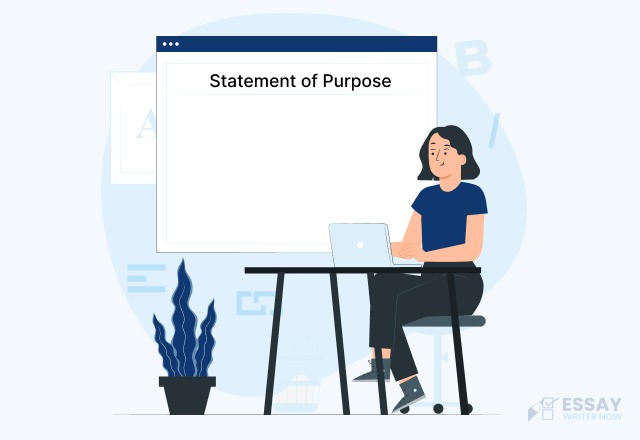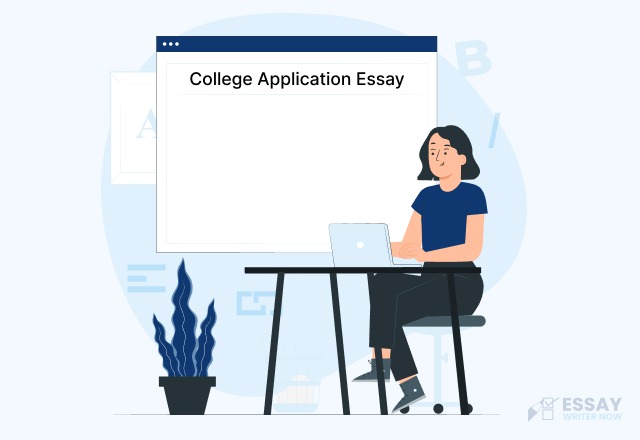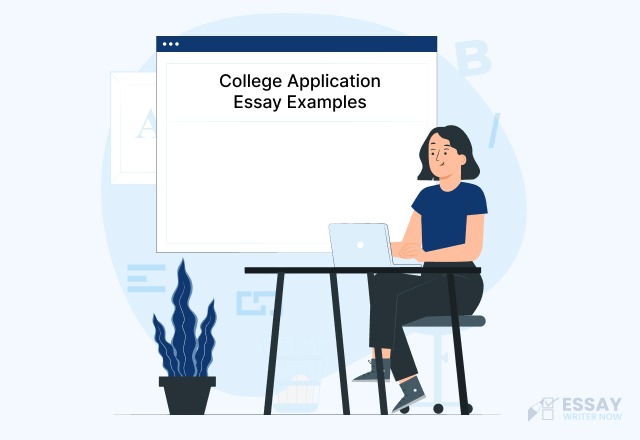What is a Statement of Purpose?
The statement of purpose is a critical piece in the application that tells admissions committees who you are and what your academic interests are. This will allow for an interesting discussion about whether or not this individual can add value to their chosen graduate program!
The statement of purpose is often one of the most critical components in an application.
Jared Pierce, Associate Director of Enrollment Services at Northeastern University, says:
| “Your statement of purpose is where you tell your story about who you are and why you deserve to be a part of the [university’s] community. It gives the admissions committee the chance to get to know you and understand how you’ll add value to the classroom.” |
How Long Should a Statement of Purpose Be?
In order to make your statement of purpose as impactful and engaging for universities, it should be between 500-1000 words. Do not exceed one page!
It is also recommended to use a traditional font with a readable size (11 or 12 points) that leaves enough white space in the margins. This is so that the document can easily be read when printed out on paper. If requested by universities, do not forget about double spacing as well!
How to Write a Statement of Purpose Step-by-Step?
Breaking down the process into easy steps can make it more manageable to write your own statement of purpose. Here is a step-by-step explanation of how you can write an excellent statement of purpose.
1. Brainstorming Your Ideas
Brainstorming your ideas is important when starting a statement of purpose. Brainstorming your ideas is a great way to get creative and come up with some unique content.
This is a chance for you to talk directly to the admissions committee. Each student has a unique story, so think about what makes you special and start noting it down somewhere.
Here are a few questions that you should answer while brainstorming:
- Why do you want to opt for a degree?
- What do you want to achieve through this degree?
- What course or program features excite you the most?
- Where do you plan to get to professionally or personally through this degree?
- How will your unique professional and personal experiences add value to the program?
- What makes you a good fit for their university?
Write down your initial thoughts on paper. This will help you start creating an outline and your first draft.
2. Draft an Outline
Next, you'll want to take the ideas that you've identified during the brainstorming process and put them into an outline that will help you write. The outline will help you stay on track with your writing.
The outline for your statement of purpose should be simple and informative. It's important to keep it short. Also, make sure to answer the question that is being asked in the prompt.
Here is a great example of how to outline your statement of purpose.
Statement of Purpose Outline 1. Introduction
2. Body
3. Conclusion
|
A well-organized and concise statement of purpose will give you a roadmap to follow.
3. Write the First Draft
When writing your statement of purpose, you should communicate who you are and why you are interested in the particular program. You should also make sure to differentiate yourself from other applicants.
The statement of purpose is your opportunity to tell your story in your own words to admissions professionals. They have already seen your transcripts, resumé, and test scores. They want to know you more.
When you start creating content, make sure to add:
What motivates you: Talk about what motivates you professionally and personally. Mention your career goals or your academic background.
Your Interest in the School: Demonstrate your interest in the grad school by talking about the features of the program that interest you most. One of those things might be experiential learning. Another thing might be learning from professors who are experts in your field.
Be Yourself: Be yourself when you write your statement. You should think about your audience, but don't forget to show them who you are. It's important to be authentic so the admissions committee can see why you would be a good addition to the program.
4. Proofread and Edit Your Statement
Make sure that you take the time to revise and edit your statement of purpose before submitting it. This document is important, and it should represent you and your goals in the best possible light. Make sure that you have a friend or family member read it over to make sure that there are no errors.
The statement of purpose is an essential part of many college applications. Do follow the above-mentioned steps to nail this piece of writing since it is an important determining factor in your admission process.
What to Include in a Statement of Purpose?
The main body of a strong statement of purpose should include the following elements:
Your Focused Interest in the Academic Field or Degree
Explain to the committee why you have chosen this particular program and field. Mention a specific area or research question that you would like to explore in greater depth if given the chance to enroll in the program.
Let them know that you have carefully considered your options and that this specific school and program are the best fit for you. A highly focused and motivated candidate is an attractive candidate.
Your Academic and Professional Preparation
Talk about what you have learned in your studies so far and how it has prepared you for your field and career. Be clear about any relevant work experiences or achievements you have had.
For example, you could mention a research project or major paper that helped shaped your current research interests. If a particular course was especially valuable to you, mention it and explain what you learned in it that was helpful or inspiring.
You could also mention any experiences you have had outside of the classroom if they are relevant to your application.
For example, perhaps you spent a summer volunteering at an adult literacy center. This experience has helped you hone your mentorship skills and will benefit you in your studies.
Being specific will make your example even stronger!
Statement of Purpose Structure
The word 'purpose' normally means 'what you want to do'. However, it has a secondary meaning, which is the quality of knowing 'that you want to do something'. Purpose in this sense means having a direction.
It is essential that your statement of purpose shows that you have a direction and know both where you are going and how you can best get there.
A good statement of purpose has the following structure:
- Your Past
Your experience in undergraduate and graduate school, as well as any other work or study experience, that has prepared you for the course of study you wish to take.
- Your Proposed Course of Study
Your proposed course of study should be a logical continuation of your previous studies and work and should prepare you for your future career.
- Your Future Career
Your future career should be something that your proposed course of study is valuable for or necessary, and it should have a logical connection to what you studied before.
Qualities of a Good Statement of Purpose
A great way to stand out in the graduate school application process is with an impactful statement of purpose. Here are the characteristics of a good statement of purpose:
Clear Articulation of Goals and Interests
In order to be accepted into a research-focused program, you must clearly state your goals for the program and what you hope to accomplish. This should include your research project(s) and what you hope to learn from them.
For a professional program, be specific about which areas of the professional field of study interest you and what skills/knowledge you hope to gain.
In both cases, don’t forget to be very clear and specific about your goals.
Evidence of Past Experiences and Achievements
A great graduate school statement of purpose will also show programs that you have already been successful in. They want applicants that will be able to follow through on their research/professional plans!
You’ll probably discuss your undergraduate studies and any professional experience you have. But be sure to draw on specific, vivid examples from your academic and professional life.
Your Compliance With the Degree Program
The third essential ingredient to making your statement of purpose exciting and engaging is presenting why you are the perfect fit. Showing that there's level-headedness in which you can see what their programs have been designed for, will show them how much thought went into choosing this specific program over all others!
Impactful Writing Expression
In order to have a strong statement of purpose or letter of intent, you need to have strong writing skills. Writing is an important skill for all graduate studies programs. You will need to be able to communicate your ideas clearly and effectively.
You should also be able to write in a descriptive but concise way. Your statement of purpose should never be longer than two pages, even without a hard word limit.
Statement of Purpose Examples
Students are often looking for samples of statement of purpose for university admission or college admission, etc. Here are a few samples that can help you learn how to write a great statement of purpose:
What To Do and What Not To Do When Writing a Statement of Purpose
There is no one perfect way to write a statement. You have to find the way that works best for you. However, there are some specific do’s and don’ts for writing a statement of purpose, which are described below.
What To Do
- Write in a way that is objective and straightforward, while still revealing your personal thoughts and feelings.
- What did you learn from your experience? What conclusions can you draw about yourself, your field, and your future goals? Write about them.
- Be specific in your explanations. Use specific examples to illustrate your points.
- Introduce your topic as soon as possible to capture the reader's attention.
- Your essay should not be more than two pages long. In some cases it might be longer, but only if the school tells you to.
What Not To Do
- Don't talk about what you have done with your life excessively in your essay.
- Do not use the "I have always wanted to be a _____" approach.
- Use a resume to list your achievements, not your statement of purpose.
- Don't try to educate the reader. The goal of the statement is to inform them about you, rather than teaching through your life experiences.
- Don’t mix your statement of purpose with a college application essay or a scholarship essay.
Tips for Writing a Statement of Purpose from Admission Officers
Here are seven tips from admission officers to help you write a successful statement of purpose for graduate school.
1. Tell Them a Story
To show that you are hard-working, dedicated, and passionate about your work, it is more effective to tell a story about how you demonstrated those qualities. Having a great story that is memorable will make your essay unique.
2. Tell Them in 1000 Words or Less, Your Reason to Join the Program
The statement of purpose is one opportunity to show that you can communicate your thoughts concisely and effectively. You will have 1,000 words to explain why you want to join a graduate program.
Make sure every word and sentence counts. The most effective essays are creative and compelling, while still trim and persuasive.
3. Help Them Get to Know You
In your statement of purpose, you have a chance to show us your character, values, and unique interests. You should also inform them about your hobbies and extracurricular interests.
4. Keep it Formal
They want you to be free in your application and not hold back, but they encourage formal academic writing. This shouldn't hold you back from sharing your personality or passion, but rather should guide your tone and grammar as you write.
5. Get it Proofread Before Submitting
Proofreading your work is important, but it is also important to have someone else look at it. You also need someone else to look at it and help you find mistakes and areas where you can improve.
Ask the person proofreading your personal statement if they were moved by your writing. If not, ask them what you can do to make it better.
6. Share the Reason for Your Lackings
If you didn't do well in your undergraduate studies, it's important to tell them why. Maybe there was a problem you were going through at the time that affected your grades.
It's important, to be honest, and show how you dealt with the problem and how it has led you to where you are today.
7. Customize Each Statement of Purpose
You should apply to several graduate schools. This is a good thing. However, when you write your essay, it is important that it sounds like you only want to go to a specific school for your graduate degree.
Include specific reasons why you want to attend their school. Make sure that some parts of the essay are different for each school.
In conclusion, a statement of purpose is a document that you submit with your application to college or graduate school which states your reasons for wanting to attend the institution in question.
It’s an important part of the application process, as it allows the admission officers to get to know you as an individual. It also helps them determine whether or not you would be a good fit for their college or not.
Looking for someone to help with your statement of purpose? Get in touch with one of these seven affordable writing services.



